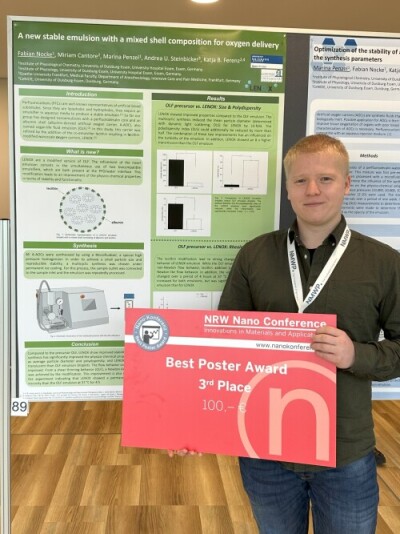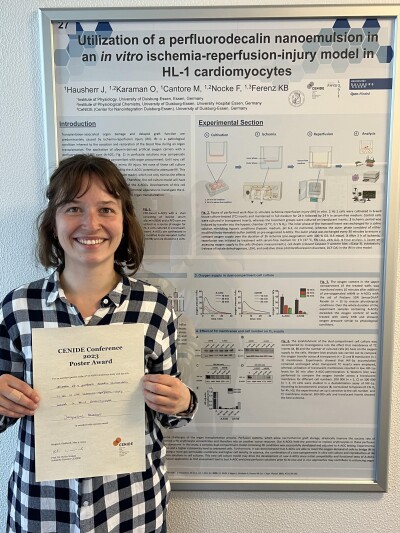Research Objective Group Professor Siebecke
The focus of the working group is on investigations into various newly developed, artificial oxygen carriers based on perfluorocarbons. In addition to functionality and toxicity, storage stability and compatibility with various clinically relevant carrier media are investigated.
In medical emergency scenarios as well as in organ transplants, an immediate and reliable supply of oxygen is of the utmost importance. In response to the limited availability of blood supplies and the need for alternatives, we have developed artificial oxygen carriers based on perfluorocarbons and the protein albumin. Perfluorocarbons are synthetically produced, perfluorinated carbon compounds (hydrocarbons whose hydrogen atoms are completely replaced by halogens, usually fluorine atoms). Due to the cavities between the individual molecules, they have a high solubility for respiratory gases such as oxygen and carbon dioxide compared to water, depending on the partial pressure, and can therefore take over or support the transport of oxygen in the blood instead of or together with erythrocytes. Oxygen uptake and release is twice as fast as with erythrocytes and directly proportional to the partial pressure of oxygen. More than 90% of the dissolved oxygen is released to the tissue, achieving three times the oxygen extraction rate of an erythrocyte. Due to the very high carbon-fluorine bond energy, perfluorocarbons are chemically and metabolically inert, so that they do not react even with highly reactive compounds and do not form toxic degradation products. Some perfluorocarbons, such as the perfluorodecalin we use, can be excreted with the breath due to their high vapor pressure and thus leave the body. The perfluorocarbons used medically do not contain any functional groups and are therefore not subject to the EU ban on polyfluoroalkyl compounds that has been in force since February 2023. In our basic, translational research, we are trying to find out more about the complex chemical and physical properties of the substance class of perfluorocarbon-based artificial oxygen carriers. In our opinion, the correlation between nanostructure, stability in the carrier medium and mechanical resilience is important for the customized production of our artificial oxygen carriers in any carrier media. Our goal is to develop functional artificial oxygen carriers that are as free of side effects as possible and that can be used without any problems in patients with oxygen deficiency or in machine perfusion in the context of transplantation. Pharmaceutical issues must also be clarified at an early stage for the use of the artificial oxygen carriers we have developed. Production should be easily scalable to the large-scale technical scale of the pharmaceutical industry. Our oxygen carriers should meet the criteria required for clinical approval, such as sterility, and should also be easy to store. Such aspects must be taken into account when selecting synthesis methods and packaging and storage, even on a laboratory scale.
Mitgliedschaften in Netzwerken / Network memberships
- Netzwerk Frauen und Geschlechterforschung NRW:
- CENIDE, Center for Nanointegration Duisburg-Essen
- ZMB, Center of Medical Biology
- EKfG, Essener Kolleg für Geschlechterforschung
- Advisory Network der Schering Stiftung






